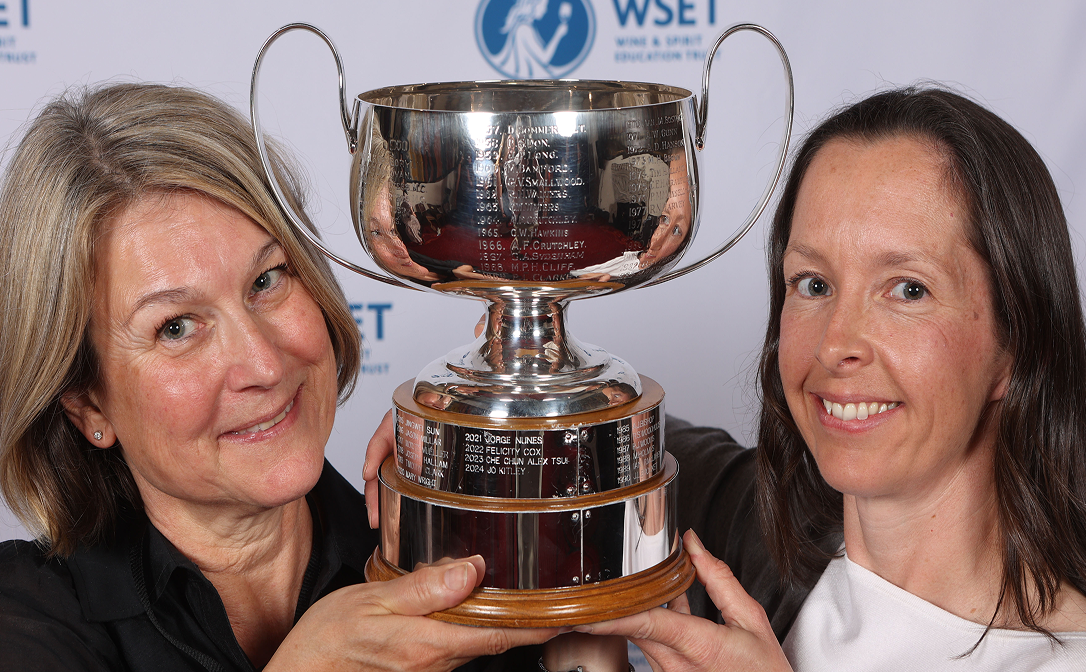When Jo Kitley, this year’s winner of the prestigious Vintners’ Cup, looks back on the beginning of her wine journey, it's clear that it all started with a twist of fate - with a broken ankle. What began as a summer spent revising Pinot Noir in the park turned into a passion for wine education and a remarkable achievement in the WSET Level 4 Diploma in Wines.
Each year, the prestigious Vintners’ Cup is presented to the student who achieved the highest overall mark across the WSET Level 4 Diploma in Wines by The Worshipful Company of Vintners. In this Q&A, we speak to the Vintners’ Cup winner about her unconventional start, the challenges of studying for the Diploma, and her advice for future students pursuing wine qualifications.
If you've successfully passed your Level 3 Award in Wines, it's time to read up on the Level 4 Diploma in Wines here. We hope to see you in a classroom soon!
What sparked your initial interest in wine, and how has that passion evolved over time?
Twenty years ago, when I was a medical student, I broke my ankle just before my final exams. I had to postpone my exams, and I also missed out on a study placement in Australia. Instead, I spent a sunny summer sitting in a park helping a friend to study for his wine exams. His revision notes on the characteristics of Pinot Noir were an awful lot more interesting than mine on the characteristics of different neurotransmitters! That summer sparked my interest in wine. It also refined my drinking habits, which, until then, didn’t get any more sophisticated than a pint of Fosters. Thank goodness for the broken ankle!
Why did you choose to study with WSET, and what does this achievement mean to you?
A few years ago, I fell ill and was unable to work as a doctor for a period of time. It was a horrible period of my life, and I needed something to distract me and keep me occupied. Since that summer spent helping my friend with his WSET exams, I’ve always thought that learning about wine would be fun and interesting. What I didn’t appreciate was how challenging it would be. The D3 Wines of the World exam was the hardest exam I’ve ever taken. I was terrified by the blind tasting and felt like an imposter amongst people who clearly knew what they were doing! Obtaining my diploma and winning this award has given me the confidence to 'talk wine' with just about anybody, allowing me to retain and enjoy all the amazing things I've learnt.

Erica Dent from Enjoy Discovering Wine, where Jo completed her Diploma, and Jo with the Vintners' Cup.
Can you share how your career has influenced your approach to wine education and appreciation?
I’m a Neurologist. So much of what I do is about pattern recognition. If you’ve seen a condition before, it’s instantly recognisable. If you haven’t, it can be impossible to work out what’s causing a person’s problems. That aspect of my day job dictated how I approached the tasting side of my studies. I figured that, if I’d never tried a wine, I’d have no hope of recognising it in an exam. So, I invested in a Coravin, filled my understairs cupboard with bottles of wine and tasted as much as I could. All that practice was crucial to passing the tasting exams and has given me a much better understanding of the styles of wine that I like.
Just like leaving all your revision to the night before would be unlikely to yield success for the theory exam, tasting a few samples the week before the tasting exam isn’t going to be enough.
If you were to give someone advice on how to tackle the Diploma exams, what top tips would you give them?
Give the tasting exams the same respect that you give the written exams and bribe a family member or friend to give you blind tastings from early on.
Just like leaving all your revision to the night before would be unlikely to yield success for the theory exam, tasting a few samples the week before the tasting exam isn’t going to be enough.
Don’t neglect the lesser-known and small print regions. Greece, Austria and some of the least famous Italian wine regions all came up in my D3 exams.
Finally, practice the physical task of writing. The D3 exam is time pressured. It would be very frustrating to have all that knowledge in your head yet not be able to get it down on paper because your hand has cramped up, or you can’t write quickly enough.
Any future plans for your wine journey? Are you planning on completing another qualification or traveling to a wine region?
Some of my best holidays have been visits to wine regions. Particular highlights include walking from village to village in Piemonte, cycling South Africa’s Garden Route and marvelling at the stunning medieval architecture in Alsace. Having invested so much time and hard work in the Diploma, it’s really important to me to maintain my knowledge. There’s no better way to gain a memorable understanding of a region’s wine than to go there. Having missed out on that trip to Australia all those years ago when I broke my ankle, I’m planning to use the travel bursary for a study placement there.


